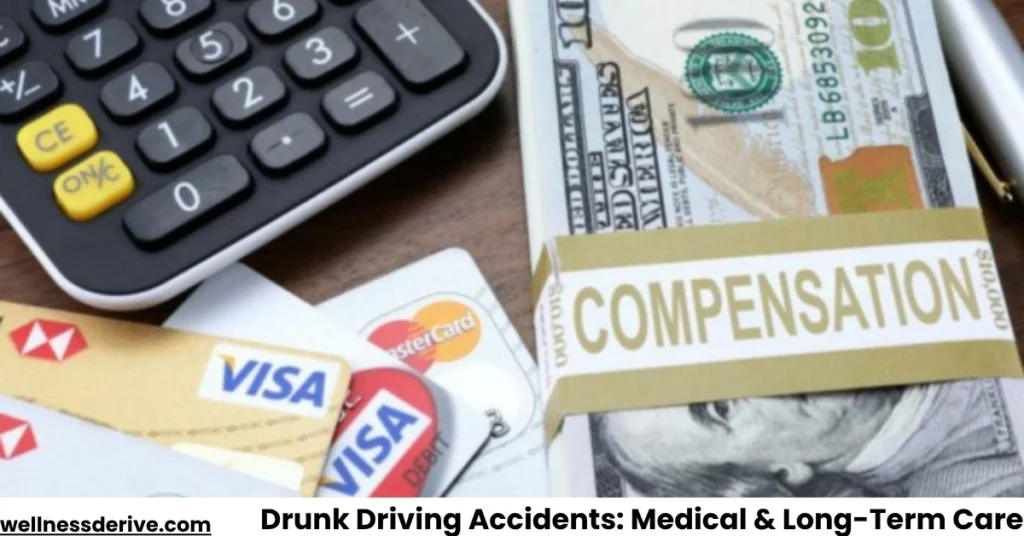When you get hurt because someone was driving drunk, you’ll most likely spend weeks in the hospital, have to go through surgery, take lots of medicine, and maybe even need help from others just to get through the day. Sometimes, the damage is so bad that going back to work or living the way you used to isn’t possible anymore.
So, when we talk about compensation after a drunk driving accident, we’re not just talking about paying today’s bills. We’re talking about making sure you get enough support to rebuild your life over the long haul.
If you’re in this situation right now, you don’t have to figure all this out by yourself. The drunk driving accident lawyers at the Morris Bart law firm work with people facing these exact problems every day. They know how confusing and overwhelming this can be, and they know how to fight to get you the full compensation you’ll need, not just for now but for years into the future.
What Medical Costs Can You Claim After a Drunk Driving Accident?
You can claim money to cover any medical treatment you reasonably needed because of the crash. And this isn’t just about the emergency room visit right after the accident. Think about everything you might have gone through.
The ambulance ride alone costs a lot. Then you had the hospital staff, X-rays, scans, doctors’ visits, and maybe surgery if your injuries were serious. If you had to be in the ICU, that would add even more costs.
The costs don’t stop when you leave the hospital. Many people need long rehab programs. You might have to go to physiotherapy for months just to get your arm moving again or to be able to walk without help. Sometimes people have to relearn simple things like how to dress themselves or hold a fork. Every single appointment and treatment takes time, effort, and money.
Then there’s the cost of medications. You might need painkillers, muscle relaxants, or special medicines to manage long-term problems like nerve pain or swelling. Sometimes, you need equipment like braces, crutches, or a wheelchair. Other times, people need special beds, oxygen machines, or other medical devices at home. None of this is cheap.
One very important thing many people don’t know is that even if you’re not using certain treatments right now, you can still claim for them if your doctor says you’ll probably need them in the future. This is called reasonable medical probability.
So, for example, if your back injury might require surgery in a few years, your compensation should include that future cost. You shouldn’t have to pay that yourself just because it didn’t happen right away.
Compensation for Long-Term Care
When you hear long-term care, you might think of elderly care homes. But in drunk driving cases, it means something different. Long-term care means the ongoing help you might need if your injuries don’t fully heal, which is often the case with serious accidents involving drunk drivers.
Imagine you can’t shower, cook, or even get dressed by yourself anymore. You might need someone to come into your home regularly to help with these daily tasks. This is called home care, and it’s essential. And this kind of care can cost thousands of dollars every month, depending on how often you need help.
Another critical part of long-term care is the loss of your ability to earn money. Maybe you can’t work at all anymore, or you can only do a less-paying job. Losing your income for good or even temporarily is a massive hit to your financial future.
That lost earning potential should be part of your compensation too. Your career and income were taken away because of someone else’s mistake, and that has to be recognized.
Long-term care also includes changes you might need in your home. You might need a wheelchair ramp, stair lifts, grab bars in the bathroom, or wider doorways to move around safely. These home modifications are costly but vital for living with disabilities.
Insurance companies don’t like paying for things that haven’t happened yet. They’ll argue that future surgeries or long-term care are just guesses. But a skilled lawyer knows how to turn those “what ifs” into facts.
Good lawyers don’t just accept the first offer insurance companies give. They know if the settlement doesn’t cover everything you need, they have to fight for more. Because once you accept money and sign papers, you can’t come back later for more, even if your injuries get worse.
Disclaimer: The content on Wellness Derive is for informational purposes only and not a substitute for professional medical advice, diagnosis, or treatment. Always consult a healthcare provider for medical concerns.



